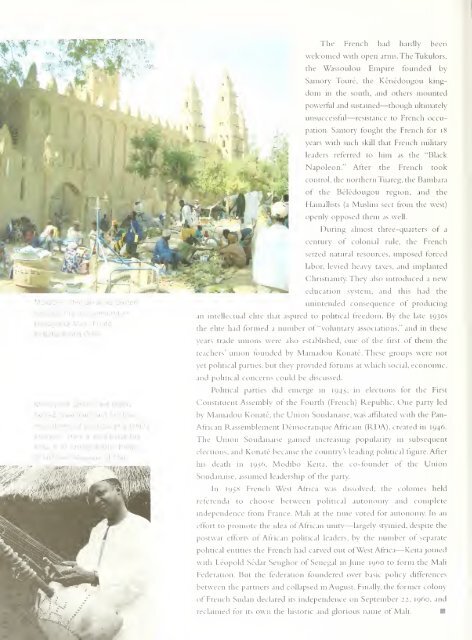SCOTLAND - Smithsonian Digital Repository - Smithsonian Institution
SCOTLAND - Smithsonian Digital Repository - Smithsonian Institution
SCOTLAND - Smithsonian Digital Repository - Smithsonian Institution
Create successful ePaper yourself
Turn your PDF publications into a flip-book with our unique Google optimized e-Paper software.
The French had hardly been<br />
welcomed with open arms. The Tukulors,<br />
the Wassoulou Empire t'ounded by<br />
Samory Toure. the Kenedougou kingdom<br />
in the south, and others mounted<br />
powerful and sustamed—though ultimately<br />
unsuccessflil—resistance to<br />
French occupation.<br />
Samory t'ought the French tbr<br />
i8<br />
years with such skill<br />
that French military<br />
leaders referred to him as the "Black<br />
Napoleon." After the French took<br />
control, the northern Tuareg, the Bambara<br />
of the Beledougou region, and the<br />
Hamallists (a<br />
Muslim sect from the west)<br />
openly opposed them as well.<br />
During almost three-quarters of a<br />
century of colonial rule, the French<br />
ters<br />
for daiiy lite m communities<br />
•"-^ :-"- '<br />
"'--'<br />
Photo<br />
-ie<br />
seized natural resources, imposed forced<br />
labor, levied heavy taxes, and implanted<br />
Christianity. They also introduced a new<br />
education system, and this had the<br />
unintended consequence of producing<br />
an intellectual elite that aspired to political freedom. By the late 1930s<br />
the elite had formed a number of "voluntary associations," and in these<br />
years trade unions were also established, one of the first of them the<br />
teachers' union founded by Mamadou Konate. These groups were not<br />
yet political parties, but they provided forums at which social, economic,<br />
and political concerns could be discussed.<br />
Political parties did emerge in I94_S, in elections tor the First<br />
Many jeliw (griot'^.<br />
skilled<br />
musicians and<br />
Constituent Assembly of the Fourth (Frencii) Republic. One parry led<br />
by Mamadou Konate, the Union Soudanaise, was affiliated with the Pan-<br />
repositor--- -^<br />
histories<br />
kora. a 21-sl!<br />
'<br />
©<br />
itical<br />
ciiiiily<br />
'lat play, the<br />
Atrican Rassemblement Democratique Africain (RDA), created in 1946.<br />
The Union Soudanaise gained increasing popularity 111 subsequent<br />
elections, and Konate became the country's leading political figure. After<br />
his death m 1956, Modibo Keita, the co-tounder ot the Union<br />
Soudanaise, assumed leadership of tiie<br />
party.<br />
In 1951^ French West Africa was dissolved; the colonies held<br />
referenda to choose between political autonomy and complete<br />
independence from France. Mali at the time voted for autonomy. In an<br />
etYort to promote the idea of African unity—largely stymied, despite the<br />
postwar efforts of African political leaders, by the number ot separate<br />
political entities the French had carved out ot West Africa— Keita joined<br />
with Leopold Sedar Senghor of Senegal in June i960 to form the Mali<br />
Federation. But the federation foundered over basic policy differences<br />
between the partners and collapsed in August. Finally, the former colony<br />
of French Sudan declared its independence on September 22, i960, and<br />
reclaimed tor its own the historic and glorious name ot Mali.
















